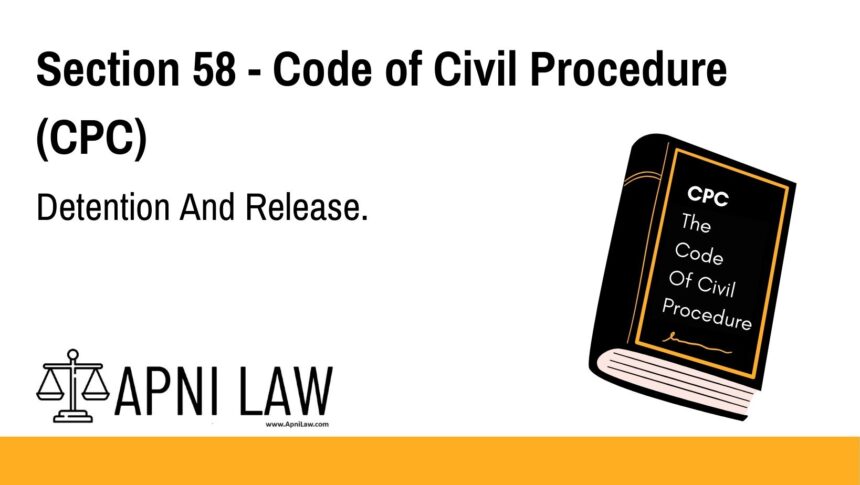Code
CPC(1) Every person detained in the civil prison in execution of a decree
shall be so detained,(a) where the decree is for the payment of a sum of money exceeding1[2[five thousand rupees],
for a period not exceeding three months, and,]3[(b) where the decree is for the payment of a sum of money exceeding two thousand rupees, but
not exceeding five thousand rupees, for a period not exceeding six weeks.]4(1A) For the removal of doubts, it is hereby declared that no order for detention of the judgment debtor in civil prison in execution of a decree for the payment of money shall be made, where the total
amount of the decree does not exceed5[two thousand rupees.](2) A judgment-debtor released from detention under this section shall not merely by reason of his
release be discharged from his debt, but he shall not be liable to be re-arrested under the decree in
execution of which he was detained in the civil prison.
Perfect — this is Section 58 CPC, which sets the limits of detention of judgment-debtors in civil prison. Let’s structure it in our SEO-optimized article format.
Section 58 CPC: Detention and Release of Judgment-Debtors
Code: Section 58 of the Civil Procedure Code
58. Detention and release.
(1) Every person detained in the civil prison in execution of a decree shall be so detained,—
(a) where the decree is for the payment of a sum of money exceeding five thousand rupees, for a period not exceeding three months; and
(b) where the decree is for the payment of a sum of money exceeding two thousand rupees but not exceeding five thousand rupees, for a period not exceeding six weeks.
(1A) For the removal of doubts, it is hereby declared that no order for detention of the judgment-debtor in civil prison in execution of a decree for the payment of money shall be made, where the total amount of the decree does not exceed two thousand rupees.
(2) A judgment-debtor released from detention under this section shall not merely by reason of his release be discharged from his debt, but he shall not be liable to be re-arrested under the decree in execution of which he was detained in the civil prison.
Explanation of Section 58 CPC
Section 58 CPC lays down the maximum period for which a judgment-debtor may be detained in civil prison for non-payment of money decrees.
Key Points:
- Detention Limits:
- For decrees exceeding ₹5,000 → maximum 3 months detention.
- For decrees exceeding ₹2,000 but not exceeding ₹5,000 → maximum 6 weeks detention.
- For decrees not exceeding ₹2,000 → no arrest or detention is allowed.
- Debt Not Extinguished by Detention:
- The judgment-debtor, after release, still owes the money.
- Detention is only a coercive measure, not a substitute for repayment.
- No Re-Arrest for the Same Decree:
- Once a debtor has been detained under a decree and released, he cannot be arrested again for the same decree.
- The decree-holder must recover the debt through other modes of execution (like attachment of property).
Thus, this section introduces both protection for debtors (limiting imprisonment) and clarity for creditors (detention doesn’t wipe out the debt).
Illustration
- Example 1:
A decree-holder seeks detention of a debtor for non-payment of ₹10,000. The maximum detention period is 3 months, after which the debtor must be released. - Example 2:
If the decree is for ₹3,000, the debtor may be detained for 6 weeks. - Example 3:
If the decree is for only ₹1,800, the debtor cannot be detained at all, as the amount is below ₹2,000. - Example 4:
A debtor detained for 3 months for a ₹10,000 decree is released but still owes the amount. However, he cannot be re-arrested for the same decree — the decree-holder must use other remedies like attachment of salary or property.
Common Questions and Answers
1. What is the maximum period of detention for money decrees under CPC?
- 3 months if the decree exceeds ₹5,000.
- 6 weeks if the decree is between ₹2,000–₹5,000.
2. Can a person be arrested for a decree below ₹2,000?
No. Section 58(1A) clearly prohibits detention for decrees not exceeding ₹2,000.
3. Does detention in civil prison discharge the debt?
No. The debtor is still liable to pay the decree amount. Detention is a pressure tactic, not a settlement.
4. Can the debtor be arrested again after release?
No. Section 58(2) prohibits re-arrest under the same decree once the debtor has been detained and released.
5. What options remain for the decree-holder after release of the debtor?
The decree-holder may pursue other execution methods like:
- Attachment and sale of property,
- Garnishee orders,
- Appointment of a receiver.
Conclusion
Section 58 CPC sets clear limits on the detention of judgment-debtors to prevent prolonged or repeated imprisonment while ensuring decree-holders can enforce their claims through other methods. It balances the rights of creditors to recover dues with the protection of debtors from excessive imprisonment.
For detailed insights on execution of decrees under CPC, visit ApniLaw








